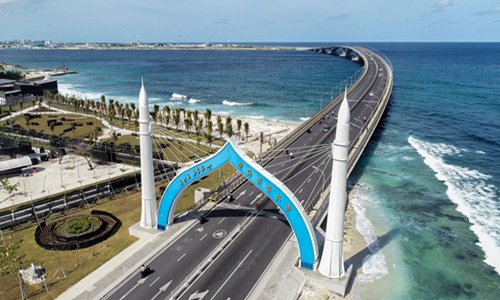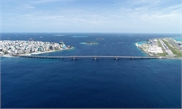
An aeriel view of the China-Maldives Friendship Bridge linking the Maldivian capital of Male with neighboring island Hulhule on Friday Photo: Xinhua
India's aid to the Maldives comes with geopolitical ulterior motives, a Chinese analyst said on Monday, commenting on India's just announced loan to help the island nation emerge from the post-virus economic crisis.
India on Sunday announced a $250 million loan to the island nation to boost its economy, a move seen by many observers as a counterweight to China's growing investment in the region.
Although the Maldives escaped the fate of having an unchecked coronavirus outbreak like India, the tourism sector has been reeling since international flights resumed in July, as tourist visits are few. The Asian Development Bank forecasts the economy to contract by 20.5 percent this year.
India has had more than 5.48 million recorded infections while the Maldives reported more than 9,700, according to data from Johns Hopkins University on Monday.
India has in past years beefed up its diplomatic relationships with neighboring countries, and the Maldives is an important pillar of this initiative. The pro-Indian approach of the incumbent Maldivian government has helped.
India's new loan brings India's financial pledge to more than $2 billion since 2018, according to a report by AFP. The move came after days after a defense agreement between the US and the Maldives to "ensure the peace and security in the Indian Ocean."
It is reported that India not only welcomed that agreement, but that US officials showed a draft of the US-Maldives agreement to Indian representatives in Male, the Maldivian capital.
India also promised to build a bridge for the Maldives, which will be longer than the 1.39-kilometer Maldives-China Friendship Bridge, one of the country's largest infrastructure projects.
Despite doubts that India might be better off if it put the money into its own infrastructure and efforts to combat the COVID-19 situation on the home front, a Chinese analyst said this move is in accordance with the Indian mindset of always regarding itself as the regional hegemonic power.
Zhao Gancheng, director of the Center for Asia-Pacific Studies at the Shanghai Institute for International Studies, said while China is looking for partners for development in the South Asian region, India has long seen itself as the Big Brother in the region. The fact that analysts read India's loan as a counterweight to rising Chinese influence in the region underlines a growing deterioration in the relationship between India and China.
"Regional confrontation and conflict is not the consensus of the countries in the region, cooperation is," Zhao told the Global Times on Monday.
Some netizens warned that the Maldives becoming an ally to India and the US in this way may not be wise, considering that Chinese tourists cannot be replaced by visitors from the US or India.
"But the ruling circles have figured out that US Imperialism and India are… friends. Will they replace the Chinese tourists who will decline to visit the beaches? We will see how this all plays out," a netizen wrote under a South China Morning Post story covering the topic.
China has been helping to relieve the Maldives' debt, which is a public concern in the country, complicated by the unexpected pandemic.
Chinese Ambassador to the Maldives Zhang Lizhong said in a tweet on Monday that in addition to the Chinese government's commitment to the G20 debt suspension initiative for bilateral sovereign loans, a discussion on commercial loan suspension requested by the Maldives is underway.
Zhang also pledged close co-operation in the recovery of tourism in the Maldives, following a meeting with the country's Tourism Minister Abdulla Mausoom in another tweet on September 14.


